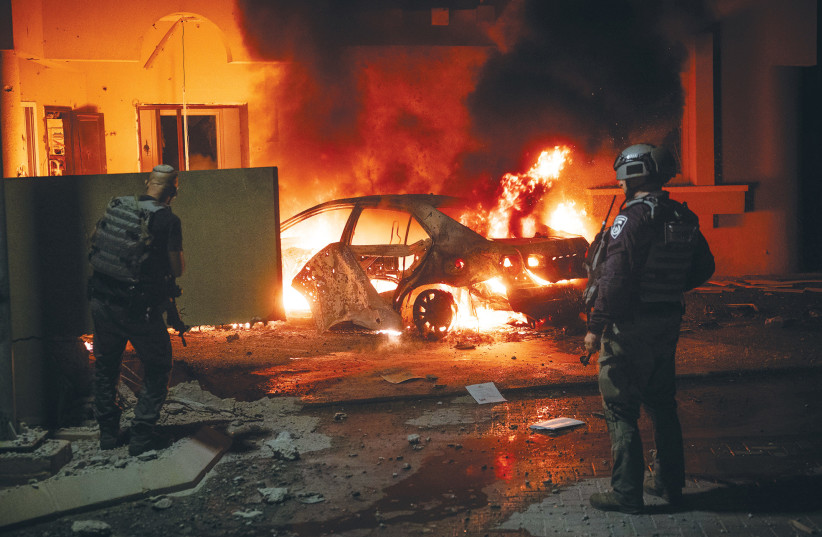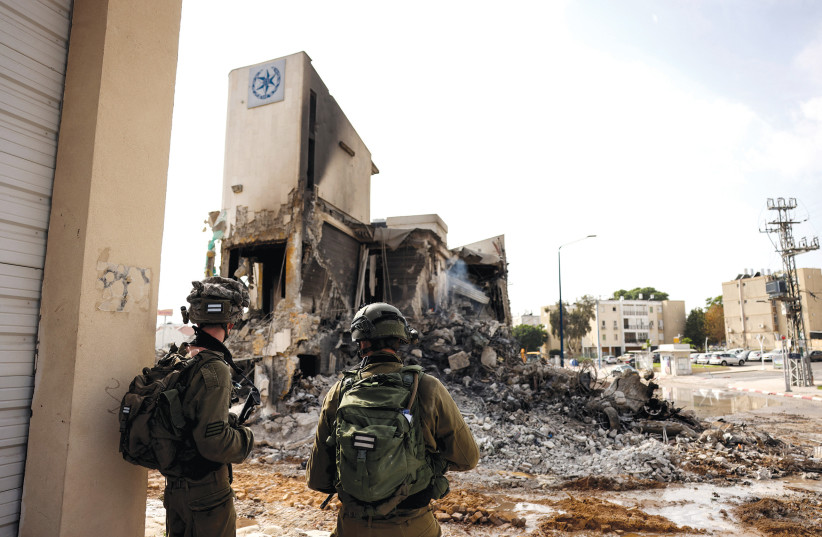This is an astounding and ultimately unacceptable dislocation. Jews made refugees in their own sovereign homeland!
DAVID M. WEINBERG NOVEMBER 4, 2023 06:08

Underreported and insufficiently understood is the scope of dislocation in Israel caused by the Hamas attack on Israel and the ensuing, ongoing, and likely-to-be-long war.
At least half a million Israelis have been made refugees in their own homeland, displaced internally due to the war. This includes Israelis whose homes in the Gaza envelope were destroyed by the enemy in the initial attack, Israelis from more than 100 communities near the southern and northern borders who have been evacuated to the center of the country by order of the military, and Israelis in southern and northern Israel who have fled on their own account to relatives in the somewhat-safer center of the country.
There also are many, many families with men drafted to the military whose wives and children feel vulnerable and who have moved to live elsewhere with grandparents or relatives.
By way of example, here are some less-than-complete statistics: More than 36,000 residents of Sderot and 18,000 Israelis who lived in 29 towns between four and seven kilometers from the Gaza border are “resting and refreshing” in over 50,000 state-subsidized guesthouses and hotel rooms. Some 65,000 evacuees/refugees are currently “sheltering” in Eilat, far from the fighting (although Iran’s Houthi junta in Yemen this week fired missiles at that city) and far from their homes, schools, and businesses.
This is an astounding and ultimately unacceptable dislocation. Jews made refugees in their own sovereign homeland! It is a shocking reality.

IDF soldiers inspect the remains of a police station in Sderot, which was the site of a battle following a mass infiltration by Hamas gunmen from the Gaza Strip, on October 8. (credit: RONEN ZVULUN/REUTERS)
War with Hamas has put Israelis out of school, people out of work, with no solution
The scope of the displacement and the uncertainty about its longevity are both traumatizing and just plain difficult. A host of secondary problems arise such as zero-to-minimal educational frameworks for children, the inability to reach places of employment or to make time for work (because kids are not in school and husbands are away), zero-to-minimal running income and a consequent inability to meet home mortgage payments or repay business loans, and so much more.
The Ministry of Labor formally estimates that 764,000 Israelis have lost their places of employment, been laid off, or were otherwise knocked out of the workforce since the beginning of the war. That is about 18 percent of the workforce!
Close to 40 percent of Israeli businesses are operating only at a rock-bottom level, with less than 20 percent of their employees. In southern Israel, 60 percent of businesses are operating at this rock-bottom level, barely surviving.
The building industry is nearly shut down, and major infrastructure projects such as rail and light-rail construction are suspended. (Almost all foreign construction workers have fled the country, and Arabs of Judea and Samaria are locked out.) The hospitality/tourism sector is devastated, the agricultural sector is struggling, and 62 percent of food production and general industries are operating at minimal levels – with less than 20 percent of their employees and with a 50-80 percent drop in business activity. More than 40 percent of all Israeli businesses have their youngest and most able employees serving on emergency draft in the military.
WORST HIT are independent businessmen who have been called to military service and, consequently, their businesses have been shuttered. Those in southern Israel in particular are not sure they will have any business to return to, either because they will soon go bankrupt or because the broader population will not be returning home anytime soon, meaning no customers.
The IDF and National Social Insurance Institute have a formula that theoretically could eventually pay self-employed and independent contractors anywhere from NIS 6,000 to NIS 47,000 in compensation per month. But that would be months from now, after businessmen file income or corporate tax returns for 2023, and by then it may be too late.
On top of this, 9,500 Israelis already have filed claims for compensation for physical damage to their homes and businesses caused by falling Hamas rockets, missiles, and shrapnel from these projectiles. This especially includes many homes and factories in Ashdod, Ashkelon, Netivot, and Tel Aviv – in addition to the Gaza envelope, of course.
On top of all these logistical and financial burdens is the challenge of dealing with the psychological trauma evoked by Hamas atrocities and military casualties, including being orphaned or widowed, and the rehabilitation of the thousands of injured Israelis; many hundreds still hospitalized.
Eventually, after Hamas is demolished and the terrorist threat from Gaza is eliminated, Israel also must (must!) rebuild the magnificent communities in southern Israel, a task estimated at over NIS 5 billion. (The government has allocated an initial NIS 1 billion for this purpose to the Shaar HaNegev, Sdot Negev, and Eshkol regional councils and the Sderot municipality.)
OF COURSE, none of this should have happened. One of the promises, at least the aspirations, of modern Zionism was that after the return to its indigenous, ancient homeland, the Jewish People would “dwell safely” in the sovereign State of Israel, under “vine and fig trees from Dan to Beersheba” (see Kings I 5:5).
Obviously, we’re not there yet. But at the very least, Israel’s borders should have been better protected, and 500,000 Israelis should not have been forced out of their homes overnight.
The good news is that Israeli society (and the global Jewish community) is up to the task and has responded gloriously with volunteer drives that go a long way in supporting the afflicted. People have responded generously with charity campaigns that take some sting out of the grand disruption. But overall, Israelis don’t want pity. Rather, they crave community and need solidarity all the way to victory over the enemy.
A wise colleague of mine asked me why I was writing this column. After all, he said to me, you won’t successfully garner more sympathy for Israel on the international scene. Palestinians are suffering far more from the terror of Hamas and from Israeli bombardment than Israelis are suffering from the terror of Hamas and its bombardments – even when considering the Hamas atrocities of October 7.
(Unfortunately, that is the way it must be if Israel is going to restore its deterrent posture and survive in the hostile Middle East, supercharged by the Islamic Republic of Iran and its proxies.)
My friend’s evaluation is correct. Israel cannot compete with the Palestinians over victimhood. Nor does it want to. Israel will not win and does not want to win the “Most Hard Hit” trophy of the year from the UN or the Academy of Motion Pictures.
The point of this article is not to claim victimhood or generate superior sympathy. Rather, I want friends of Israel to have a clear picture of how battered Israelis are, how infuriated they are, and how resilient they are. The dislocation is enormous and probably will get worse before it gets better – but nobody plans to run away.
Winning the war will require great reserves of spiritual and social stamina, as well economic reserves – and Israel will find them. Israelis are mobilized to the highest degree at every level of society to do so.
What I really want is for friends of Israel to be similarly infuriated and motivated to stand strong – and to build for themselves, too, abundant reserves of spiritual and social stamina for the long road ahead.
The writer is founding senior fellow at the Misgav Institute for National Security & Zionist Strategy. The views expressed here are his own. His diplomatic, defense, political, and Jewish world columns over the past 27 years are at davidmweinberg.com.
Content retrieved from: https://www.jpost.com/opinion/article-771441.